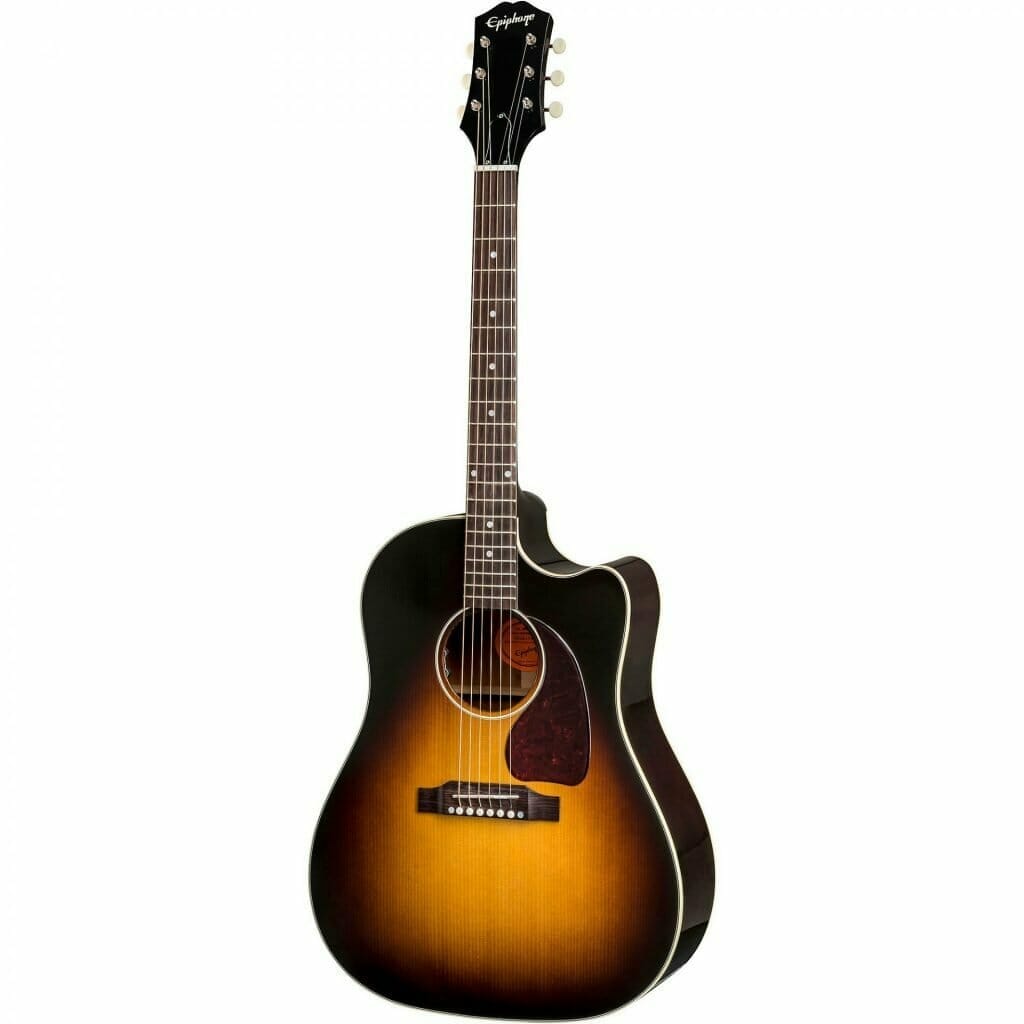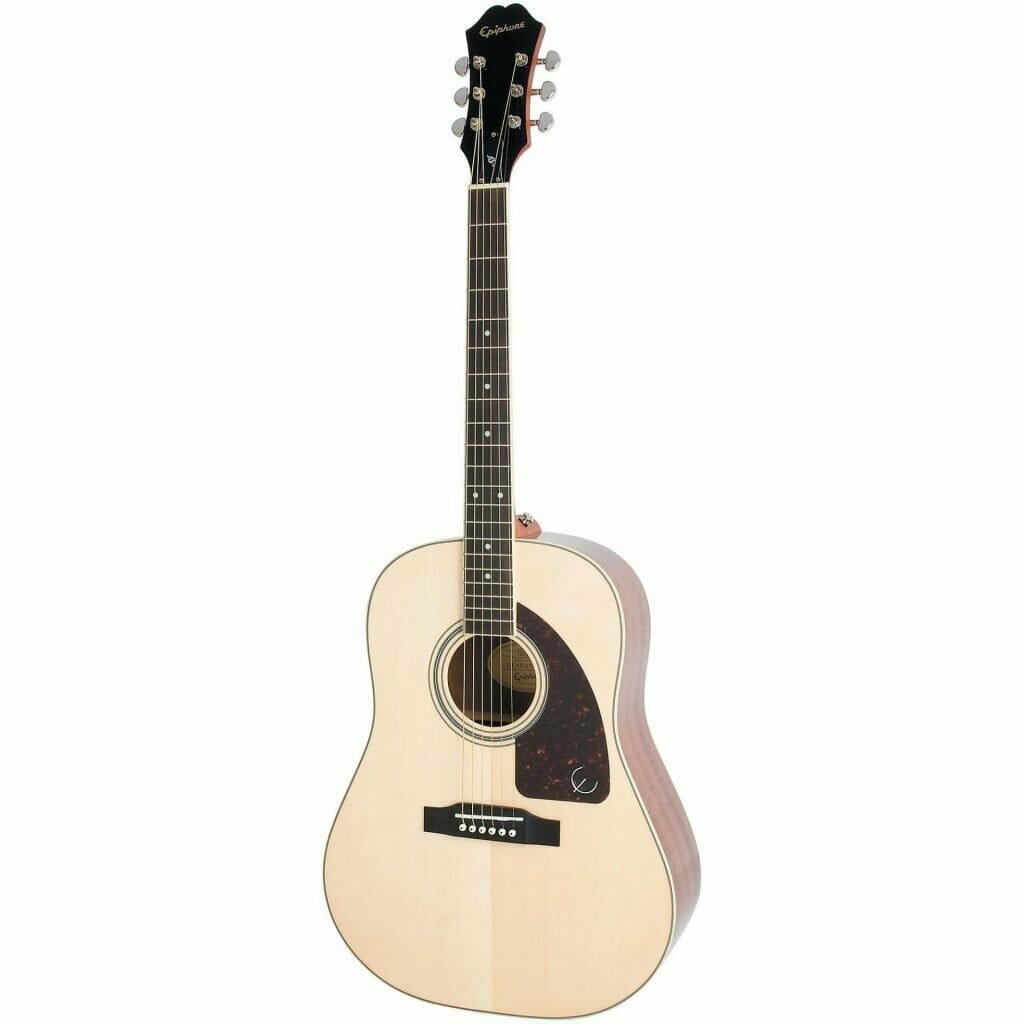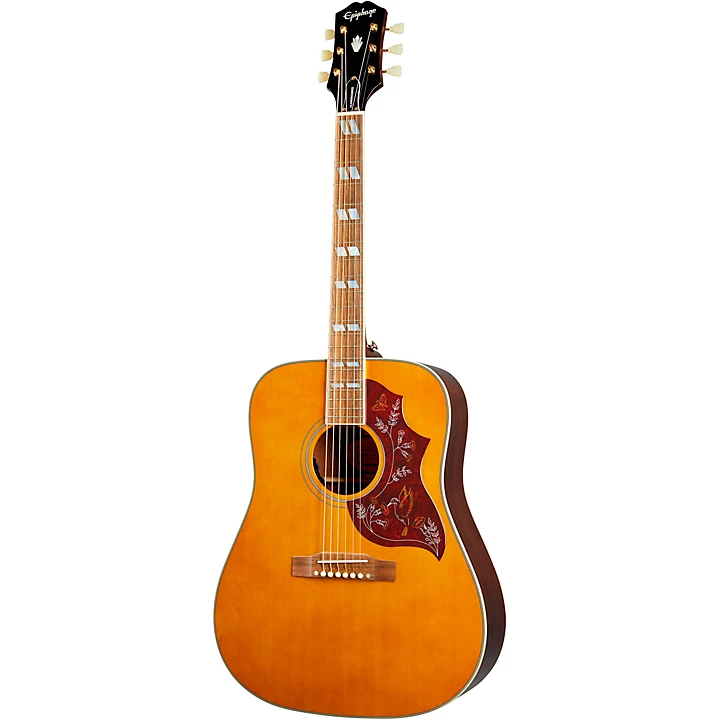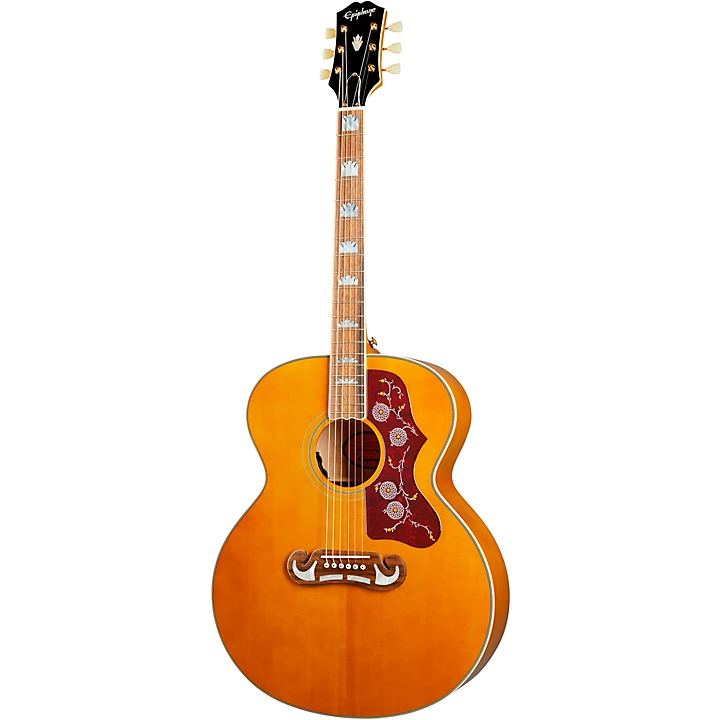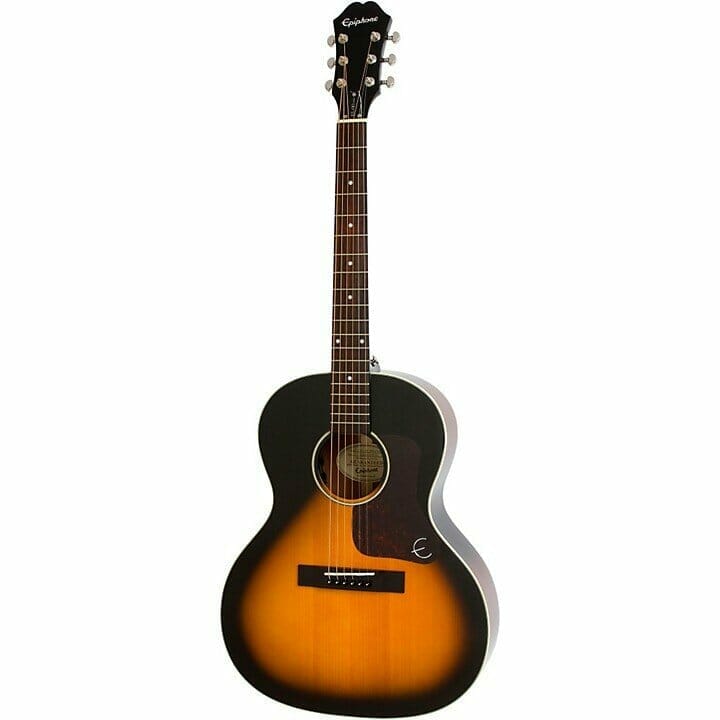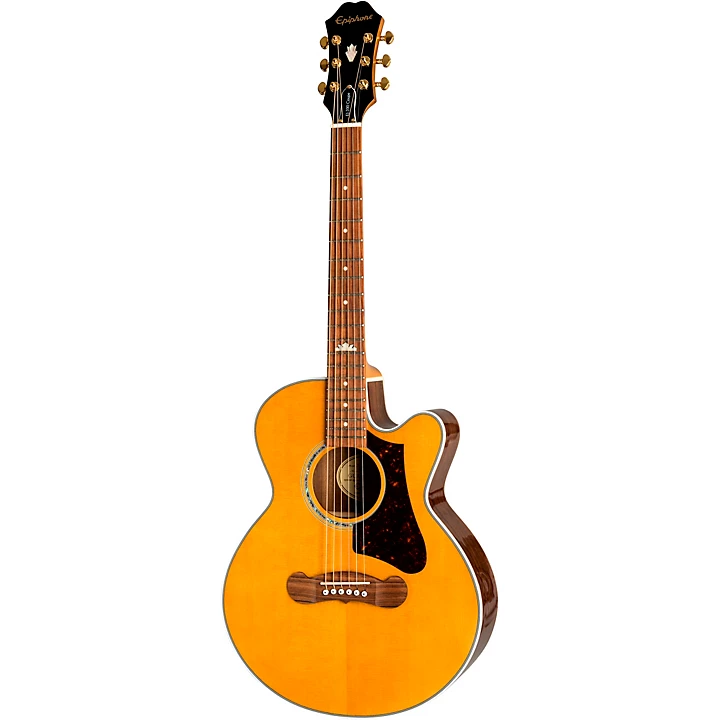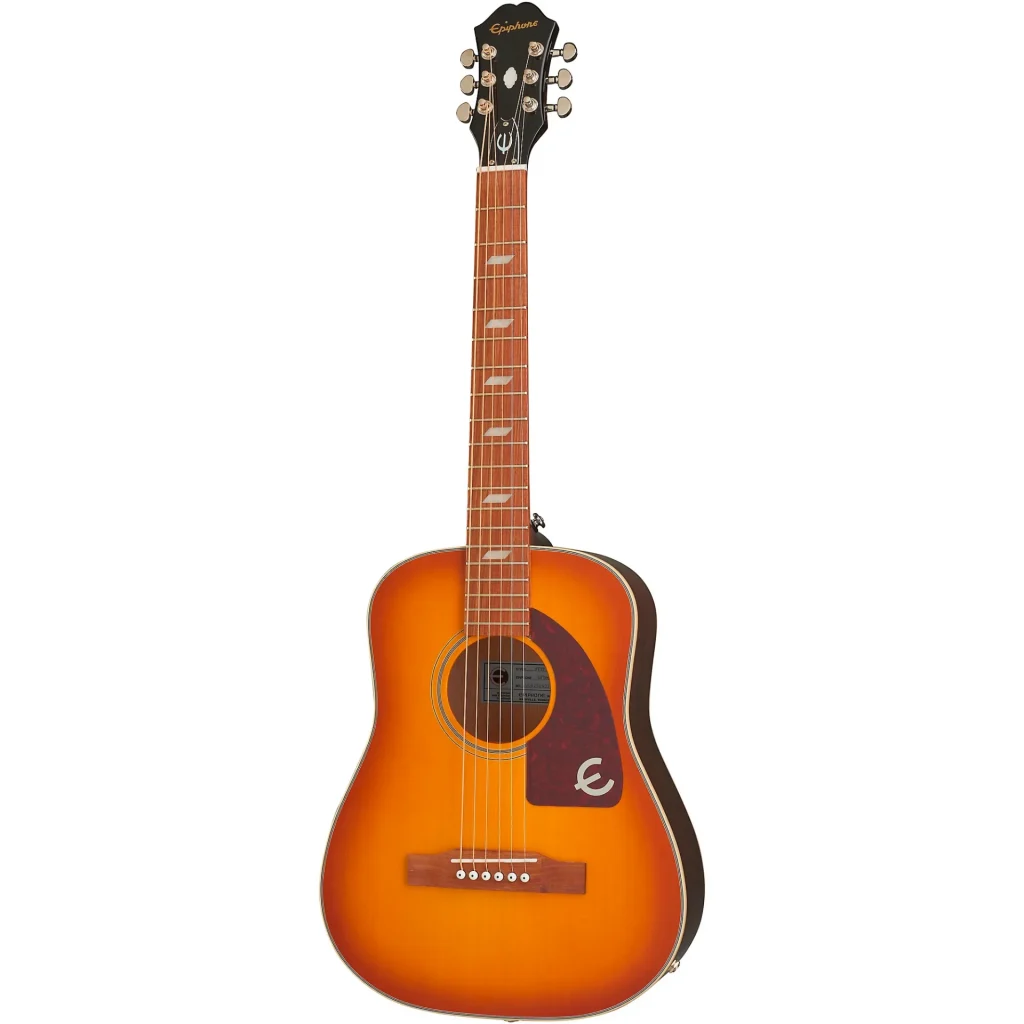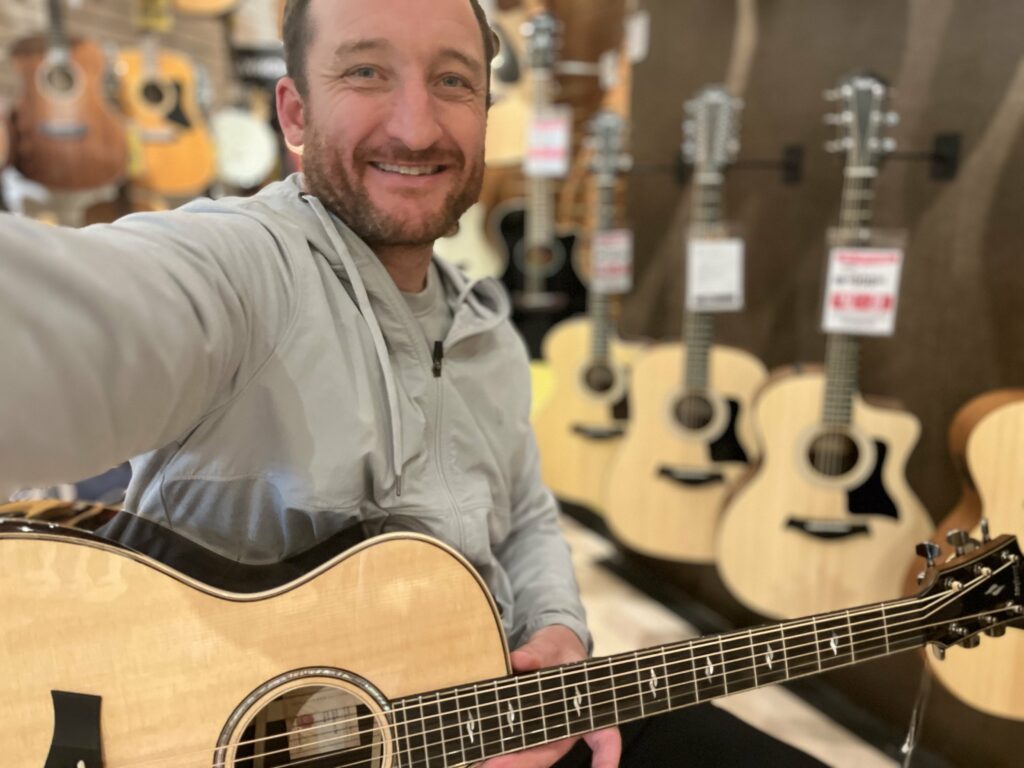Epiphone acoustic guitars sometimes get a bad rap as the “poor person’s Gibson.” However, you may wonder if Epiphone may be a best-kept secret to getting that Gibson vibe and tone without paying Gibson Guitars pricing.
Well, spoiler alert. Epiphone guitars make excellent, low-cost replicas of Gibson’s vintage acoustic and electric guitars that look wonderful and have good sound quality, especially with their “Inspired by Gibson” line.
However, now the question is, which are the best Epiphone acoustic guitars? Because not all Epiphone acoustics are great guitars.
In this article, I’ve used my decades of guitar-playing experience, countless trips to guitar shops, and reading/watching reviews online to create a definitive list. Whether you just started playing guitar or are an experienced pro, I’m sure there is something that will pique your interest!
With further ado, let’s dive into this Epiphone guitars review!
The Short Answer
The best Epiphone acoustic guitar is the J-45 “Inspired by Gibson” if you’re looking for the classic tone of the Gibson sloped-shouldered dreadnought acoustic guitar (read full review here).
However, if you want to dive deep into the vintage character of blues and folk fingerstyle music, the L-00 studio is a must-have.
-Brad Johnson (Founder/Writer of Song Production Pros)
Table of Contents
Best Overall: J-45 Inspired by Gibson
- Topwood: Solid Spruce
- Body Wood: Mahogany
- Body Shape: Jumbo
- Bracing: X-Bracing
- Neck Wood/Radius: Mahogany/12''
- Fingerboard: Laurel
- Frets: 20
- Electronics: Fishman Preamp with Sonicore Undersaddle Pickup
- Case: N/A
Epiphone’s J-45 Acoustic Guitar is a beautifully crafted tribute to an absolute legend.
The original J-45 debuted in 1942 and quickly became known as the standard by which all other dreadnoughts would be judged. With its balanced, robust low end and rugged midrange, the J-45 is perfect for musicians with a bit of swagger.
If you’re looking for an acoustic guitar that can do that "Gibson Thing" for a lot less money, the Epiphone J-45 is a clear choice.
- Beautiful guitar with a classic, vintage tone
- Perfect for fingerpicking, strumming, and singing
- Has the classic dreadnought body style that can cut through a busy mix
- You'll have an instrument that you'll want to keep and play for years
- It lacks the depth, weight, and full-spectrum sound of other dreadnought-style guitars
- It doesn't come with a case
Full Review:
The Epiphone J-45 Inspired by Gibson, is an excellent pick for anybody looking for a guitar that lives up to the hype of its “big brother!”
It features a solid Sitka spruce top and mahogany back and sides, giving it a warm vintage tone emphasizing the mid-range.
The Epiphone J-45 comes as either a slope-shouldered dreadnought or as a cutaway. Each has a timeless look crafted for a bluesy tone, projection, playability, and aesthetic beauty.
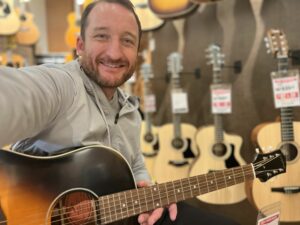
The construction of a 24 3/4″ short-scale body, a mahogany neck, and a laurel fingerboard has proven popular among guitarists. It produces a pleasant deep tone while being comfy to play. The shorter scale makes this a fantastic option for players with smaller hands and female guitar players.
The gorgeous aged gloss finish accentuates its distinct look and perfectly suits the artist who wants to make a statement when performing out.
The J-45 includes Fishman Sonicore under-saddle pickups that will let you bring the guitar’s sound to the stage. However, Sonicore electronics don’t save you from a bit of the “piezo quack.”
However, if you’re looking for that Epiphone J-45 sound and playability but want to save thousands, the Epiphone J-45 Inspired by Gibson is a no-brainer. This is the best Epiphone acoustic-electric guitar for intermediate players and pros alike!
Best for Budget: J-45 Studio
- Topwood: Solid Spruce
- Body Wood: Mahogany
- Body Shape: Jumbo Dreadnought
- Bracing: X-Bracing
- Scale Length: 25.5''
- Neck Wood/Radius: Mahogany/12''
- Fingerboard: Laurel
- Frets: 20
- Electronics: N/A
- Case: N/A
The Epiphone J45 Studio is the perfect guitar for budget-minded players who still want a great-looking and playing instrument.
With its unique bell-like shape and larger lower bout, the J45 Studio has a distinctive voice perfect for various styles.
So if you're looking for a great deal on a classic guitar, the Epiphone J45 Studio should be at the top of your list.
- Solid spruce top provides excellent value for money
- The neck has a slim and comfortable feel to it
- Classic design that will stand the test of time
- This is an entry-level guitar, so while it looks great, the sound is 2-dimensional
- Will most likely require a setup after purchase
- Gig bag not included
Full Review:
The Epiphone J-45 Studio is the budget version of the Overall Best pick. It is the best affordable guitar for beginners who want a classic-looking acoustic guitar.
Most inexpensive guitars have all laminate construction. However, the Epiphone J-45 Studio features a solid spruce top, providing fantastic sound, resonance, and balance for a guitar in this price range. Solid wood also ages, improving the guitar’s sound with time.
The neck has a slim and comfortable feel, and the short scale of the J-45 makes fretting easier due to less string tension.
The Epiphone J-45 Studio will surely please any player with its beautiful aesthetic and great playability.
Best for Wall Mounting: Epiphone Hummingbird Studio
- Topwood: Solid Spruce
- Body Wood: Mahogany
- Body Shape: Dreadnought
- Bracing: X-Bracing
- Neck Wood/Radius: Mahogany/12''
- Fingerboard: Pau Ferro
- Frets: 20
- Electronics: Fishman Sonicore
- Case: N/A
The Epiphone Hummingbird Studio acoustic guitar is a marvel of beauty and design.
The distinctive hummingbird pickguard sets off the body while beautiful, split parallelogram inlays give the Pau Ferro fingerboard its own elegance.
If you're looking for an acoustic-electric guitar you want to show off in your home or office, the Epiphone Hummingbird Studio is the perfect choice.
- Comes with the beautiful and iconic hummingbird pickguard
- Great affordable alternative to the more expensive Gibson models
- It comes standard with classic and elegant split parallelogram fret inlays
- It has a thin-sounding low-end compared to other dreadnought-style guitars
- Onboard electronics suffer from the piezo "quack"
Full Review:
OK, before you start flaming me in the comments, I want to clarify: guitars are meant to be played! However, I know that guitars are sometimes appreciated for their craftsmanship and beauty, and people want to display them for the world to see.
With that out of the way, the Epiphone Hummingbird Studio is an acoustic-electric guitar with gorgeous vintage appointments. It is as much a work of art as it is a musical instrument.
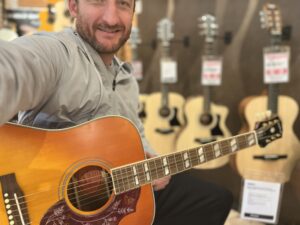
While this guitar will look fantastic on your wall in your home office or recording studio, it should be noted that it features a Solid Spruce top. So please be careful exposing it to humidity or extreme weather conditions to avoid cracking and warping the guitar.
Suppose you’re a collector or a guitar player seeking one of the most beautiful guitars from any guitar brand. In that case, the Epiphone Hummingbird Studio is for you!
Best for Flatpicking & Strumming: J-200
- Topwood: Solid Spruce
- Body Wood: Solid Maple
- Body Shape: Jumbo
- Bracing: X-Bracing
- Neck Wood/Radius: 2-Piece Maple, Mahogany Center Strip/12''
- Fingerboard: Indian Laurel
- Frets: 20
- Electronics: Fishman Sonitone
- Case: N/A
The "King of Flat Tops" is the perfect instrument for guitar players who want to be seen and heard
This acoustic guitar is perfect for those who want that classic vintage Gibson design and playability without paying an arm and a leg.
- Excellent projection and loud sound
- Great for country, rock, and pop performers
- A beautiful and timeless design that will catch anyone's attention
- Great affordable alternative to Gibson's more expensive model
- Jumbo body size can be uncomfortable for smaller players
- The tone, when lightly strummed/fingerpicked, can lack articulation and depth
Full Review:
The Epiphone J-200 Inspired by Gibson is a fantastic acoustic-electric guitar for flatpicking and strumming. This guitar has a solid Sitka spruce top and maple back and sides. This tonewood combination creates great projection, a wide dynamic range, and a balanced tone ideal for country and rock performers.
The fantastic vintage pickguard with a flower-and-dot pattern will catch the attention of anyone who sees it. While the maple mustache bridge with curving inlays adds a unique touch to this guitar that you won’t find on any other model.
The Indian laurel fingerboard is easy to play. The classic mother-of-pearl graduated crown inlays add to its timeless elegance.
The J-200 by Epiphone provides a soundhole-mounted preamp with easy access to a rotary tone and volume control, designed for performing artists who need to make quick adjustments while playing live.
The Epiphone J-200 easily equips the guitar player who wants their cowboy chords and big lead lines to project and fill a large room!
Best for Recording & Fingerstyle: L-00
- Topwood: Solid Spruce
- Body Wood: Mahogany
- Body Shape: Parlor/Concert
- Bracing: X-Bracing
- Neck Wood/Radius: Mahogany/12''
- Fingerboard: Indian Laurel
- Frets: 19
- Electronics: Fishman Sonicore
- Case: N/A
The Epiphone L-00 is the perfect guitar for recording and fingerstyle campfire jams.
With its easy-to-play design and classic Vintage Sunburst finish, this guitar will produce a tight, woodsy, focused sound that will sit great in your next track.
- Produces a punchy and articulate vintage sound
- Great for recording artists, songwriters, and fingerstyle players
- Affordable and compact size
- The tone lacks some weight and depth compared to other parlor guitars
- You may have to set up the guitar to get it to play the way you want straight out of the box
Full Review:
The Epiphone L-00 is a tiny, sleek acoustic-electric guitar with a focused, punchy voice. If you’re a recording artist, this is the best Epiphone guitar for you.
The small, pinched body shape produces an articulate and balanced sound. This helps a great acoustic guitar microphone pick up every nuance, resulting in an audio track that is easy to manipulate and blend into a mix.
The guitar’s mahogany body also generates a warm, rich sound with plenty of sustain. The 24.75″ scale length makes this guitar simple to play, particularly for lengthy periods. This is crucial when recording many passes of the same take in the studio!
While this guitar can produce excellent recordings, it is also fantastic for the guitar player sitting around strumming chords or fingerpicking melodies on the couch at home.
Best for Gigging: J-200 EC Studio Parlor
- Topwood: Solid Spruce
- Body Wood: Ovangkol
- Body Shape: Jumbo Junior
- Bracing: X-Bracing
- Neck Wood/Radius: Hard Maple with Walnut stripe/12''
- Fingerboard: Pau Ferro
- Frets: 20, Medium
- Electronics: Fishman Presys with Sonicore Pickup
- Case: N/A
The J-200 EC Studio Parlor from Epiphone is the perfect guitar for gigging musicians.
This acoustic delivers a big, full, rich sound that will impress any audience. The Maple neck with Walnut center stringer and Pau Ferro fingerboard offers incredible response and feel for hours of comfortable playing.
Whether you're strumming chords or finger-picking melodies, this guitar will become your go-to instrument for any gig.
- Feel the power of the J-200 in a more convenient package
- The smaller size is great for portability
- It's easy to play for long periods, making it perfect for your next tour
- Extremely versatile guitar
- When playing with a guitar strap, you'll feel some slight "neck dive"
- Laminated back and sides slightly hinder the full tone you could get from this style of guitar
Full Review:
The Epiphone J-200 EC Studio Parlor is a classic acoustic guitar with modern touches.
This smaller-sized jumbo acoustic-electric guitar has the same tone, volume, and playability as the American classic, the J-200.
The J-200 by Gibson was designed and appreciated for its loud and cutting sound. This was essential for guitar players to be heard over drums and other musical instruments. However, as amplification became more prevalent, the J-200 EC Studio Parlor was created to commemorate the power of the original J-200 but with modern conveniences like portability and pickups.
In standard Epiphone & Gibson tradition, this guitar’s 24.75″ scale length makes it simple to play for lengthy periods, making it ideal for your next tour.
If there’s one thing to remember, the J-200 EC Studio Parlor will never let you down in any genre or style you play—from rock to country and pop; this guitar has your back!
Best for Travel & Kids: Epiphone Lil’ Tex
- Topwood: Solid Spruce
- Body Wood: Sapele
- Body Shape: 3/4 Sized Guitar
- Neck Wood: Mahogany
- Fingerboard: Granadillo
- Frets: 19, Medium
- Electronics: Passive Piezo
- Case: N/A
Whether you're hitting the beach, hanging around a campfire, or want a guitar to keep in your car, the Lil' Tex Travel Acoustic is a perfect choice.
With its compact size and robust full tone alike, this little instrument offers much more than a cool-looking finish.
- Great for travel
- It's an excellent guitar for kids and beginners
- There's an acoustic bass guitar version
- Comes with a gig bag & electronics
- Tone lacks depth and weight
- Some users reported intonation issues with the factory setup
Full Review:
The Epiphone Lil’ Tex is a great travel acoustic guitar that captures the spirit and tone of a vintage full-size Epiphone Masterbilt Texan.
This guitar features a solid spruce soundboard and an all-mahogany body for robust, full tone and impressive projection.
The Mahogany neck has an excellent feel and playability. At the same time, the passive under-saddle piezo pickups produce incredible amplified acoustic sound.
The Lil’ Tex is a great travel companion but also makes a fantastic beginner kids guitar.
The small Epiphone Lil’ Tex Acoustic Guitar makes it perfect for taking on any journey!
The Epiphone Acoustic Guitar Buying Guide
Suppose non of the Epiphone acoustic guitar reviews mentioned above was an exact match for you. The following buying guide will show how to choose the best Epiphone acoustic guitar for your style and vibe.
Body Shape
The best acoustic guitars are the ones that you don’t want to put down. When purchasing any guitar, the first thing you want to consider should always center around the body shape, no matter what type or brand it may be from.
Body shape has a massive impact on tone and playability. Some bodies have more projection and overtones, which are great for big cowboy chords. In comparison, some have more articulation between notes with less projection, great for fingerstyle guitar playing.
Also, certain body types are going to be more comfortable than others. A small-bodied parlor guitar sits closer to the body and feels more intimate. At the same time, a Super Jumbo might be uncomfortable for smaller-framed players.
Small Body
Traveling musicians and kids will love this guitar style because of the small body design. It’s a shrunken version of Epiphone’s full-size guitars, meaning it has all the classic features that fans know and love but in a portable package!
If you’re looking for something beautiful, practical, and has a small footprint, a small-sized Epiphone is designed for you.
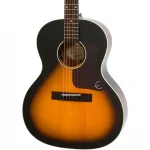
Parlor
Epiphone parlor guitars are well-known for their woody sound. Blues musicians favor this body shape because it gives them a more aged and worn-in tone.
These guitars are great for guitar players with small hands, kids, and fingerstyle because the short-scale of parlors makes them easy on the fretting hand.
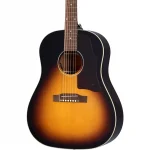
Round Shoulder
Round shoulder dreadnought Epiphone acoustic guitars are the body shape of flagship Gibson models, which Epiphone replicates.
Martin Guitars created the classic dreadnought body shape in 1916. It is the most well-known acoustic guitar body design in history. However, Martin designs their guitars with a square shoulder.
Gibson, the cool, rebellious brand, wanted their unique take on the traditional dreadnought shape. So they built theirs with a round shoulder they used on other Gibson acoustics and brought a new identity to the dreadnought guitar.
Suppose you’re searching for a vintage, pre-war Gibson dreadnought at an affordable price. In that case, the round-shoulder Epiphone will be the model to choose.
Popular Round Shoulder Epiphone Acoustic Guitars:
Epiphone Masterbilt Excellente
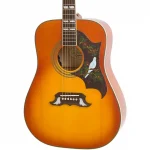
Square Shoulder
As previously stated, Martin produced squared-shoulder acoustic guitars, whereas Gibson produced round-shoulder acoustics.
However, in the 1960s, Gibson released square-shoulder acoustic guitars like the Hummingbird and Dove. There is a lot of debate if there are any fundamental tonal distinctions between round and square-shoulder dreadnought guitars.
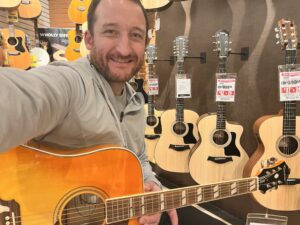
When it comes to the best Epiphone acoustic guitar for you, it will come down to what aesthetic style you prefer for your dreadnought.
I think the two most beautiful-looking guitars are in the square shoulder family. These would be the Epiphone Hummingbird Pro and the Epiphone Dove.
So use your eyes and your ears with your decision 🙂
Popular Square Shoulder Epiphone Acoustics:
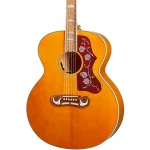
Super Jumbo
The Super Jumbo acoustic guitar is undoubtedly one of the most well-known acoustic guitar body shapes available, crediting its design to the Gibson/Epiphone brand.
Hailed as the “King of Flat-Tops,” this body style produces giant projection and a bold tone. It’s also got a beautiful look that will turn heads at your next gig.
If you’re searching for a performance guitar perfect for strumming and flatpicking, the Super Jumbo is the one to choose.
Popular Super Jumbo Epiphone Acoustic Guitars:
Tonewoods
It’s crucial to consider the woods from which your guitar is constructed. Tonewoods all sound distinct, and knowing what they are could help you choose the best Epiphone acoustic guitar for your style and needs.
The Soundboard (Topwood)

The most essential tonewood is an acoustic guitar’s soundboard (or top wood). It will have the most significant impact on your guitar’s projection, playability, and dynamics.
Spruce is the most popular tonewood for acoustic guitar soundboards, and the characteristics of spruce are:
- High Dynamic Range
- Warm Overtones
- Scooped Mid-Range
It won’t be difficult for you to choose an Epiphone based on top wood. All of their guitars are constructed of spruce. So the only choice is between solid spruce or laminated spruce guitar. However, the better Epiphone acoustic guitars will have solid wood construction.
Laminated Spruce vs. Solid Spruce
Acoustic purists will insist that you only buy a guitar with a solid spruce top. Anything else is a waste of money.
Solid wood guitars have a superior tone, appearance, and sound quality. The wood ages; thus, the guitar’s sound improves with time.
However, due to weather changes, solid wood is more fragile and susceptible to cracking and warping.
If you travel a lot, a laminated guitar might be an excellent fit for you.
Suppose you’re searching for a tone that complements the beauty of the best Epiphone acoustic guitars. In that case, I recommend choosing a solid wood top.
Body Wood
The guitar’s body adds “seasoning” to the sound. It must be considered when selecting the best Epiphone acoustic to suit your needs.
Because Epiphone uses only spruce as their top wood, the body wood choice will be the biggest differentiator for the tone and style of guitar you’re purchasing.
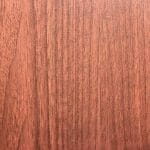
Mahogany Wood Body
Mahogany’s resonant tones are typically deep and mellow. Its combination with the other tonewoods typically results in a warm tone and helps even out the sound of the top wood.
A solid Mahogany body is easy to maintain because it is durable and resistant to changes in weather and moisture.

Maple Wood Body
Maple wood generally has a big, bright tone with a flat eq response. This means maple doesn’t color the guitar’s sound as much as mahogany.
Maple is a hardwood commonly used as the back and sides of Epiphone acoustic guitars with a more oversized body style. Maple has an excellent projection, making it an ideal tonewood for your acoustic guitar to cut through a busy mix of drums and electric guitars.

Ovangkol Wood Body
Ovangkol was introduced by Taylor Guitars, which is known for its focus on sustainability. Ovangkol has been used as a substitute for Rosewood because it is a far more environmentally friendly tonewood.
The Ovangkol tone is characterized by full, rich tones and highs and a somewhat more emphasized mid-range than Rosewood.
However, there is still a little “scoop” in the mid-range, making this body wood ideal for singer/songwriters since the vocals can occupy that frequency range without clashing with the guitar.
Laminate Body
Some less expensive Epiphone acoustic guitars will have a laminated wood back and sides. As stated earlier, laminate isn’t always a negative thing. It can be considerably more durable than solid woods.
Laminate, on the other hand, has a less resonant sound. Because laminate materials produce fewer overtones, laminate guitars are sometimes described as sounding flat and two-dimensional.
Consider an Epiphone guitar constructed of laminated wood if you’re searching for a durable instrument that won’t break the bank.
Neck Profile
Gibson guitars introduced a slim-taper neck shape in the 1960s, and it has since been used on most Epiphone guitars.
This neck design starts rounder at the neck nut for more comfortable cowboy chords and gets more flat as you move up the neck to be more comfortable for faster lead playing.
However, not everyone is a fan of the slim-taper neck style, so keep it in mind while shopping for the best Epiphone acoustic guitar for you.
Scale Length
You can find the guitar’s scale length by doubling the distance between the nut and the 12th fret.
A full-scale guitar is approximately 25.4 inches. On the other hand, a shorter-scale instrument has a scale length of around 24.7 inches.
Shorter-scale guitars have a more “slinky” playing style and are generally easier to play, especially for beginning guitarists.
However, full-scale guitars tend to stay in tune better if you want to play in alternative open tunings.
Electronics and Pickups
When purchasing a new acoustic, you must consider whether you want electronics and pickups.
When performing, an acoustic-electric guitar allows you to connect to an amplifier, PA system, or audio interface while reducing feedback caused by using an external microphone.
Most Epiphone models feature Fishman Sonicore under-saddle pickups. However, suppose you don’t require this function. In that case, you may be able to purchase a higher-quality guitar for less when it doesn’t include the electronics or pickups.
FAQ
Commonly asked questions when looking for the best Epiphone acoustic guitars.
Are Epiphone acoustic guitars good for beginners?
Yes, Epiphone guitars are excellent for beginner guitar players and kids.
Epiphone acoustic guitar models have different price points to meet any budget.
Epiphone also makes plenty of short-scale guitars, which are generally easier to play for children and beginners who haven’t built up the strength in their fretting hand.
Also, with classic body styles and beautiful finishes, these eye-catching musical instruments are built to showcase to friends and family. When a guitar is displayed in plain sight, it gets played more.
Are Epiphone acoustics good?
Yes. Epiphone acoustic guitars are excellent instruments and provide an economical alternative to the Gibson acoustic line. They also produce a variety of sizes, types, and price points to meet the needs of most players.
In addition, Epiphone provides a wide range of finishes to choose from, so you can find the perfect look for your style.
What famous musicians play Epiphone Acoustic Guitars?
Guitar players and songwriters have been playing Epiphone guitars for over half a century.
Some famous musicians that have been seen playing an Epiphone Guitar are:
• Bob Dylan
• Paul McCartney
• James Bay
• Marc Bolan
• Tom DeLonge
• Trent Reznor
• Billie Joe Armstrong
• Noel Gallagher
What’s the difference between the Epiphone Hummingbird and Epiphone Dove?
The difference between the Epiphone Hummingbird and Epiphone Dove is the neck shape, length, design, and aesthetic.
The Dove is a full-scale guitar (25.5”) compared to the Hummingbird (24.75”). This difference will make the Dove’s strings feel stiffer than the Hummingbird’s. However, from my tests doing this Epiphone acoustic guitars review, I found the neck feels slimmer on the Dove than the Hummingbird, making it easier to grip if you have small hands.
The Dove also has Maple back and sides, whereas the Hummingbird has Mahogany. This gives the Dove more tone projection and balance than Mahogany’s midrange bump.
The last big difference is the pick-guard & bridge design. The Dove has the dove wings on the bridge with the Dove on the pick-guard. While the Hummingbird has the iconic flowers/hummingbird pick-guard with a standard bridge.
To Wrap Up
If you want a guitar with a vintage rock n’ roll sound but don’t want to spend a fortune on it, an Epiphone acoustic is a great option. There are lots of guitars for every budget and playing style.
The best Epiphone acoustic guitars have a rich sound, good playability, and a beautiful appearance that will turn heads no matter what setting you play your guitar in.
If you’re searching for the most versatile guitar in their lineup that will serve you well for years to come, our Best Overall Choice, the J-45 Inspired by Gibson, is the one to choose!

